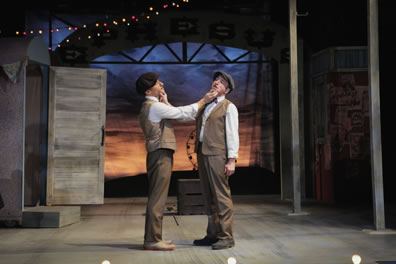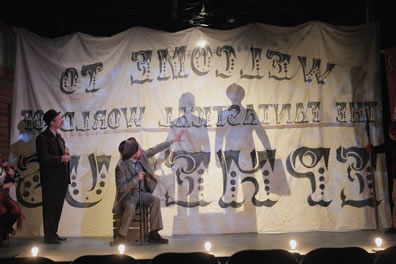The Comedy of Errors
The Fantastical World of Ephesus
Cincinnati Shakespeare Company, Cincinnati, Ohio
Saturday, November 22, 2014, G–12 & 13 (right stalls)
Directed by Patrick Flick
To the Elizabethans, Ephesus was a strange place. It was magical, but not in a Disneyland way. It was mystical, but in a dark way.

Dromio of Syracuse (Jeremy Dubin, left) and Dromio of Ephesus (Paul Riopelle) check out their mirror images in the last scene of Cincinnati Shakespeare Company’s production of William Shakespeare's The Comedy of Errors. Photo Mikki Schaffner Photography, Cincinnati Shakespeare Company.
Here is how it is described by one visitor: "They say this town is full of cozenage, as nimble jugglers that deceive the eye, dark-working sorcerers that change the mind, soul-killing witches that deform the body, disguised cheaters, prating mountebanks, and many such-like libertines of sin." That description is rendered by Antipholus of Syracuse newly arrived in Ephesus in William Shakespeare's The Comedy of Errors, a description many Americans might interpret thusly: "You mean, Ephesus was a carnival?"
And, thusly, Patrick Flick sets his Cincinnati Shakespeare Company production of the play in an early 20th century traveling carnival, with a wolf woman, snake handler, and jugglers. Important in this interpretation is how Scenic and Lighting Designer Andrew J. Hungerford's stage is set up when we enter the theater: Along with playbills and posters to the side (advertising the "Tallest Man on Earth" at 8'4"), a curtain hangs across the stage emblazoned with "Welcome to the Fantastical World of Ephesus." But the slogan is backwards because we are backstage; we are part of this carnival world, so much so that almost all of the characters' entrances and exits are through the audience. A notable exception is Angelo the goldsmith (Billy Chace), a cape-twirling magician who relies on thunder and sudden blackouts to make his entrances and departures out a side door—until confusion over whether or not he gave the chain to Antipholus leaves him so confused he misses the door on one of his exits and face plants the wall.
Flick does much more than use Antipholus's description of "prating mountebanks" and "soul-killing witches that deform the body" and "libertines of sin" and "dark-working sorcerers" as so much stage business. These turn out to be the characters in the play, such as the hack magician Angelo. The Courtesan (Caitlin McWethy) is the half-woman, half-man sideshow. Thanks to Costume Designer Noelle Wedig (whose work for the whole cast is authentically detailed and wonderfully done), McWethy is convincingly a woman with long hair and curvy build when profiled on her right, and convincingly a man with bald head, stubble on the chin, and masculine build when profiled on her left. The Second Merchant (Courtney Lucien) in tux and tails fights off the sword-wielding Antipholus of Syracuse with a water-squirting boutonniere. The Officer (Andrew Gehrlein) is a sad-faced clown who is paid off with a large lollipop. Dr. Pinch (Brent Vimtrup) is dressed as a snake-oil salesman but talks like a tent revival preacher brandishing his tambourine in the faces of the sinners.
Vimtrup does triple duty, also playing an enigmatic Balthasar (Antipholus of Ephesus's guest for lunch) and Solinus, the Duke in Shakespeare's play, the carnival boss here. Yes, a carnival boss's decree of death for any Syracusian seems a bit extreme, but this is the Fantastical World of Ephesus (and maybe Syracuse is a rival circus?). However, where Flick's concept is really put to the test is the "dark-working sorcerer" in this production: the Abbess, played by Abby Rowold as a gypsy fortuneteller. Shakespeare purists will be shocked that the Abbess has been turned into a fortuneteller (and those in the audience new to this play will marvel that Shakespeare wrote such a fortuneteller, if they are not already astounded that he portrayed a half-man-half-woman courtesan). However, that same purist will yet be fascinated by the fortuneteller's use of tarot cards—matching each card to Shakespeare's verse—to rebut Adriana when arriving at her conclusion of what drove her husband, Antipholus, to madness. "Why bear you these rebukes, and answer not?" Luciana (Maggie Lou Rader) urges her sister, Adriana (Miranda McGee). "She did betray me to my own reproof," Adriana replies.
And who are the "disguised cheaters" in this Fantastical World of Ephesus? That would be the two Antipholi and Dromios, though they know not that they are. The two Antipholi (Justin McCombs, doing poetic energy as the Syracusian, Josh Katawick doing manic frustration as the Ephesian) both wear blue blazers, white pants, and white fedoras, though, if the other characters paid close enough attention, they would see that Antipholus of Syracuses's blazer has tan trim and pocket handkerchief while Antipholus of Ephesus's blazer has red trim and pocket handkerchief. The two Dromios wear workman's brown pants and vests, but their bowties match the colors of their master's neckties and their shoes and dog caps are different shades, Dromio of Syracuse (Jeremy Dubin) in tan, Dromio of Ephesus (Paul Riopelle) in dark gray.

Egeon (Frank Delaney, seated) describes his life story with the help of shadows as Solinus (Brent Vimtrup) listens in the Cincinnati Shakespeare Company’s production of The Comedy of Errors by William Shakespeare. Photo by Mikki Schaffner Photography, Cincinnati Shakespeare Company.
Don't dig too deep to find what job Antipholus has in this Ephesian carnival. What matters are the mood of dark magic and confusing (or confused) characters that envelops the plot and the mode of vaudevillian craziness that drives the action. When it comes time for Antipholus and Dromio of Syracuse to do the great comedy routine on Nell the kitchen wench as a globe in which Dromio "could find out countries in her," the stage lights suddenly go down, a spot comes up on Antipholus and Dromio, and a ba-da-boom drum punctuates each joke. They have become an act in the Ephesus carnival. Later, when Dromio is trying to jest his way through yet another sticky situation with Antipholus of Ephesus, he looks to the theater gods for help and then provides the "ba-da-boom-bissshhh" himself.
It is in this manner that the two Dromios steal the show, in their vaudeville antics and their frantic comings and goings creating confusion both on stage and off. When Dromio of Ephesus comes on stage to hand his master a rope after his master has sent him (actually Dromio of Syracuse) for bail money, that is the moment that all of Shakespeare's shenanigans in this play pay off, and it pays off effectively here. Flick has trimmed some of the archaic gristle to get the play's running time down to two swiftly moving hours (plus intermission), and neither the plot nor the play's dramatic undertow suffer from the trims, pacing, or even the carnival setting.
McGee's Adriana is mostly played for laughs. Her sermon to Antipholus of Syracuse (whom she thinks is her husband, Antipholus of Ephesus) on marriage duty is bipolar in its delivery, pinging back and forth between serious sweetness and crazy lady that it certainly holds your attention. Egeon, on the other hand, masterfully played by Frank Delaney, is all serious, and his opening tale of how he and his wife and their twin sons and their twin servants were severed from each other, though aided by a shadow show through the curtain, is riveting in the telling, not just for us but for Vimtrup's Solinus. You realize in this particular staging how the Duke can be so vehement at first but soften his stance and actually war with himself on whether to uphold his legal decree or bend it for this Syracusian. Solinus's reaction is all on Egeon's performance, and Delaney clearly fills this Solinus with sympathy.
It is such performances—from the Egeon-Solinus opening through the double-double Antipholus-Dromio interactions—in which the actors play with honest human connections that ultimately make this Comedy of Errors successful comic drama. The carnival world would have been a crutch otherwise, but here, it truly is the Fantastical World of Ephesus.
Eric Minton
November 25, 2014
Comment: e-mail editorial@shakespeareances.com
Start a discussion in the Bardroom



 Find additional Shakespeareances
Find additional Shakespeareances